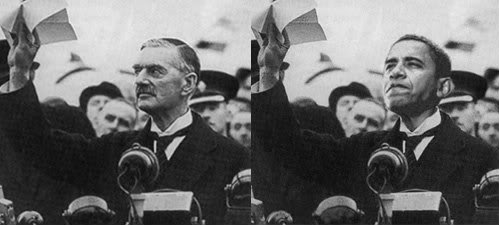
“Now I believe for the first time there will not be war”. This was an English diarist in September 28, 1938, slightly less than a year before the Second World War broke out, writing on the eve of the Munich agreement.
Of course, we all know with hindsight that you would have had to be an imbecile to have imagined such a thing by that stage in the advance of Nazi Germany. Had Hitler not already made his hostile intentions perfectly clear in Mein Kampf, in his aggressive rearmament in breach of the Versailles treaty terms, his Austrian Anschluss, his increasing persecution of the Jews and his noises about the Sudetenland?
But actually this diary entry was from the extremely well-connected and well-informed Duff Cooper who at the time was serving in the Cabinet as First Lord of the Admiralty. He later changed his mind about treating with Hitler and resigned his position. The point though is this: if even a man like that could, however briefly, gull himself into the immensely fashionable narrative that another global conflict with the Germans was unthinkable is it any wonder that the outbreak of the Second World War 75 years ago today caught so many by surprise?
Duff Cooper’s naivety (as it seems now, though I think “wishful thinking” is a fairer term) was shared by many writers and politicians and ordinary folk of the period. Read the diaries of almost anyone in the emigre community of artists, boulevardiers and journalists in Paris in that era: few of them entertained the idea until the very last minute (June 1940) that such a glorious city could possibly fall to the Germans.
Or read the autobiography of Raphael Lemkin, the Jewish lawyer who coined the term genocide, where he describes his narrow escape – from Poland via Lithuania to Stockholm – from the Germans in 1940. Time and again in cities which have yet to fall to the Nazis he meets fellow Jews who try to reassure him (or more likely themselves) that the German advance has gone as far as it will go and that the worst cannot possibly happen to them. Next thing you hear they’re all dead or on the way to being dead in concentration camps.
So what lessons can we learn from history on the anniversary of the world’s greatest ever conflict?
Many, I’m sure, but mine are this: that no one ever knows anything about anything; that those who do predict events correctly are not so much prescient as lucky (though I think we can probably agree that some men – such as Churchill – are both); and that history is contingent (which is to say that nothing is guaranteed: not the endurance of the Roman Empire, nor the everlasting “peace dividend” of World War II).
Some see in Putin’s behaviour – the massive arms building programme, the adventurism from Chechnya and Georgia to Ukraine – the birth of a new Hitler. Others reckon the Middle East will prove the tinderbox that sets the world on fire. Still others see in China’s Pacific ambitions the same instincts that led Japan to bomb Pearl Harbor.
Personally I don’t, but perhaps that’s partly because I’m as prone to wishful thinking as the next man who just wants a quiet life for himself and his family. All I do know, is this: the times we are living in are definitely not the kind of times you’d want a weak, vacillating, ill-advised, culturally insecure, strategically illiterate, tactically incompetent President in the White House; nor when you’d want Britain in the hands of a government so blind to history that it is prepared to take the gamble of shredding its already shoestring armed forces by 20 per cent.

COMMENTS
Please let us know if you're having issues with commenting.